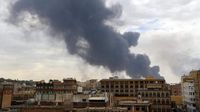In a significant shift in U.S. foreign policy, President Donald Trump announced on Tuesday, May 6, 2025, that the United States will cease its bombing campaign against Yemen's Houthi rebels, effective immediately. This announcement came during a meeting at the White House with Canadian Prime Minister Mark Carney, where Trump revealed that the Iran-aligned group had agreed to stop their attacks on critical shipping lanes in the Middle East.
Trump stated, "They said please don't bomb us anymore and we're not going to attack your ships." He emphasized that he would accept their word, marking a turning point in a conflict that has seen escalating violence and significant civilian casualties. The U.S. military had conducted over 1,000 strikes against Houthi targets since March 2025, claiming to have killed hundreds of fighters and leaders within the group.
The announcement follows a series of Israeli airstrikes on Yemen, which targeted the capital Sanaa and the main international airport, resulting in at least three fatalities and 35 injuries, according to Houthi-affiliated reports. This escalation occurred just days after a Houthi missile struck near Ben Gurion Airport in Tel Aviv, an action described by the Houthis as solidarity with Palestinians amid ongoing tensions following the October 2023 Hamas-led attacks.
Oman played a pivotal role in mediating the ceasefire agreement, with Foreign Minister Badr al-Busaidi stating that the deal ensures neither side will target the other, including U.S. vessels operating in the Red Sea and the Bab al-Mandab Strait. This assurance aims to maintain freedom of navigation and the smooth flow of international commercial shipping, a critical component of global trade.
Trump's declaration marks a notable change in the U.S. stance towards the Houthis, who have been active in the region since the outbreak of the Israel-Hamas war. The group has been launching missiles and drones at vessels in the Red Sea, claiming their actions are in support of the Palestinian cause. Despite the ceasefire with the U.S., the Houthis have indicated their intent to continue supporting Gaza, with Mohammed Ali al-Houthi, head of the Houthi Supreme Revolutionary Committee, stating, "We will continue to support Gaza to end the war."
As the situation remains volatile, the U.S. military's intensified operations against the Houthis, branded as Operation Rough Rider, aimed to curb their attacks on shipping in the Red Sea. The Houthis' missile strikes on Israel and their involvement in the conflict have drawn international attention, complicating the dynamics in the region.
The ceasefire announcement comes at a time when the humanitarian crisis in Yemen is dire, with millions facing food insecurity and lack of access to basic services. Rights activists have long raised concerns about civilian casualties resulting from U.S. airstrikes, highlighting the need for a more diplomatic approach to resolve the ongoing conflict.
In the wake of the ceasefire, the focus now shifts to the broader implications of this agreement. While the U.S. halts its airstrikes, the Houthis' actions towards Israel and their commitment to support Gaza could lead to further tensions in the region. The international community will be watching closely to see if this ceasefire holds and whether it can pave the way for a more comprehensive peace process.
As the world grapples with the complexities of Middle Eastern geopolitics, the ceasefire between the U.S. and the Houthis represents a potential shift towards de-escalation. However, the path to lasting peace remains uncertain, with deep-rooted issues still in play.
In summary, the U.S. decision to stop bombing the Houthis comes amid a backdrop of escalating tensions and violence in the region. The agreement brokered by Oman offers a glimmer of hope for a more peaceful resolution, but the situation remains precarious, with the Houthis' ongoing support for Gaza and their missile strikes on Israel adding layers of complexity to an already volatile landscape.
The future of U.S.-Houthi relations and the broader implications for the Middle East remain to be seen, as both sides navigate the delicate balance between military action and diplomatic engagement.


